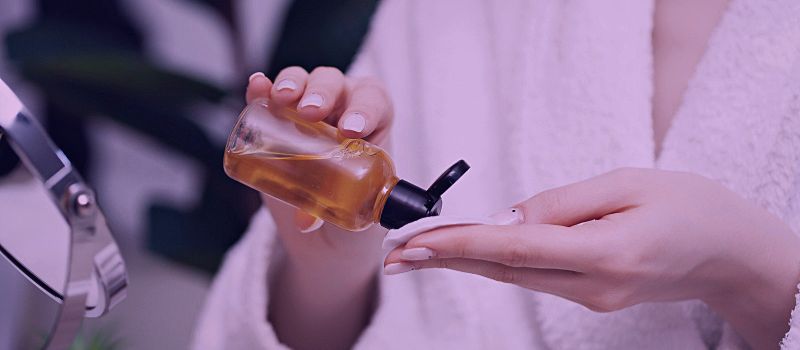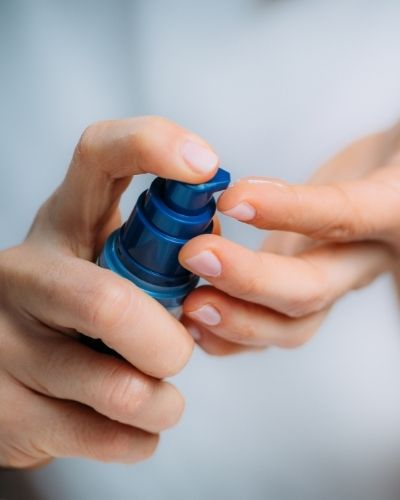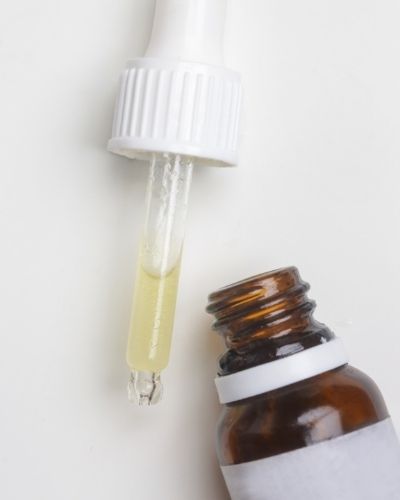Retinol isn’t the same as exfoliating, and although both products have a similar effect on the skin, they work differently.
This means that retinol doesn’t necessarily replace exfoliating; however, depending on your skin needs, you can incorporate both into your skincare routine or opt for either one of them.
In this article, I will talk about the differences between retinol and exfoliation, and I will explain how they both work, as well as how to use them for the best results.

What is Retinol?
Retinol is a vitamin A derivative that is commonly used in skincare products.
It is known for its anti-aging properties and ability to improve the appearance of wrinkles and fine lines.
Retinol can also help even out skin tone and rough, bumpy texture, and depending on the formulation, it can also help clear acne breakouts and fade post-inflammatory hyperpigmentation and redness left from pimples.
How Does Retinol Work?
Retinol works by increasing cellular turnover, which will inevitably cause the dead skin cells on the skin’s surface to shed faster.
This action will clear out and decongest clogged pores and shed superficial hyperpigmentation until the skin tone is completely evened out and uniform.
Other than that, retinol can also neutralize free radicals and boost the production of elastin and collagen, which are the proteins that make the skin elastic and bouncy.
An increase in collagen and elastin production creates a “plumping” effect, which reduces the appearance of fine lines, wrinkles, and enlarged pores.
Finally, retinol is an antioxidant that can scavenge free radicals and reverse skin damage caused by environmental pollutants, and it has also been proven to balance your skin hydration levels.
Some benefits of using retinol include:
- Decongested pores.
- Getting rid of acne.
- Improved wrinkles and fine lines.
- Brightening of hyperpigmented spots.
- Evening out uneven skin tone and texture.
- Getting rid of sun damage.
- Improving skin hydration.
Is Retinol The Same as Exfoliating?

Retinol isn’t the same as exfoliating because it doesn’t remove dead skin cells from the skin’s surface as exfoliating acids do.
Instead, the small molecules encourage rapid cellular renewal from the deeper layers of the skin.
The rapid cellular turnover will inevitably cause the dead skin cells on the skin’s surface to shed faster over time, which is why it can be said that retinol has an exfoliating-like action, but it’s a little bit different than regular exfoliation.
When using an exfoliator, such as a physical scrub or a product that contains exfoliating agents such as alpha hydroxy acids (glycolic, lactic, mandelic) or beta hydroxy acid (salicylic acid), you are applying something that will work directly on the skin’s surface and shed the dull, dead skin cells.
This is why your skin feels soft and smooth and looks refreshed, evened out, and clear after using these agents.
On the other hand, retinol does this over time because it needs more time to work below the skin’s surface and on a cellular level.
Additionally, another reason why many people think that retinol exfoliates the skin is that retinol can cause a flaking reaction for some people, especially when starting to use it or when you are moving towards a stronger retinol product.
However, this is a temporary side effect of retinol, and it shouldn’t be mistaken for exfoliation because it will stop occurring as your skin gets used to the product, which is the goal.
If your skin continues to shed for a long time after starting retinol for the first time or starting stronger retinol than the one you’ve used before, it most probably means that your skin is having a hard time tolerating the active ingredient and that you should either up your hydration and moisturization game, or choose a different (or a milder) product.
RELATED: Will Retinol Shrink Pores?
Can You Exfoliate While Using Retinol?
If you are using retinol, you can still exfoliate your skin, but you should do so carefully.
Exfoliating scrubs and acids will definitely be too strong for skin that’s getting used to retinol, so you should definitely avoid doing it if this is your current situation.
However, if you are an experienced retinol user, you can slowly start incorporating gentle exfoliating acids into your skincare routine on evenings when you’re not using retinol.
This is how you will ensure that your skin remains healthy instead of becoming dry and irritated due to the strong active ingredients.
So the best way to exfoliate while also using retinol is to do it once or twice a week on evenings when you’re not using retinol.
Don’t worry about skipping retinol once or twice a week, the active will still work and continue to give results. The most important thing is to maintain healthy skin.
Additionally, opt for products that contain low percentages of exfoliating acids, something such as 1-2% salicylic acid or 5-8% glycolic acid.
Starting with a gentle product will help your skin get used to it quicker and you will have a smaller chance of experiencing potential side effects.
Side Effects of Using Retinol with Exfoliating Products
Using retinol with exfoliating products isn’t always a smooth journey, and side effects can definitely occur, especially if you aren’t careful with these active ingredients.
Some potential side effects of using retinol with exfoliating products include:
- Dryness.
- Irritation.
- Redness.
- Flakiness.
- Peeling and shedding.
If you experience any of these side effects, it’s best to either reduce the frequency of exfoliating or opt for a milder product.
Additionally, you can consider doing the same with retinol if the side effects become too much to tolerate.
How to Avoid Side Effects of Using Retinol with Exfoliating Products?

Here are three easy tips to help you avoid potential side effects of using retinol with exfoliating products:
Don’t Rush Into It
As I already mentioned above, the most important thing when using retinol with exfoliating products is to not rush into it.
We all want to see results, but rushing into using these two actives is more likely to lead to dry and irritated skin, which can be a challenge to repair.
So, doing this is definitely not worth it if your long-term goal is to have healthy, glowy, and clear skin.
Additionally, if you are uncertain or scared of mixing retinol with exfoliating products but still want to try it out, you can always consult with an esthetician and ask for their opinion and recommendation of products that go well together.
Use a Great Moisturizer
Moisturizing when using retinol with exfoliating products is key to maintaining healthy skin.
This is because both retinol and exfoliating products can be drying to the skin, so adding a heavy-duty moisturizer to restore hydration and protect the skin barrier is crucial.
Always Wear Sunscreen
Both retinol and exfoliating products (especially alpha hydroxy acids) can increase sun sensitivity, which is why wearing sunscreen in the morning is another essential.
Make sunscreen a habit, and you won’t have to deal with burns and skin damage from UV rays.

My name is Simone and I am a certified skin specialist. I created this website to teach my readers how to take great care of their skin and I also like to occasionally share my honest opinions on skincare products I’ve tried. You can learn more about me here.

Thank you for this information on wonderful benefits of retinol